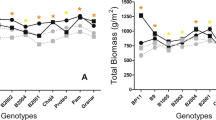Abstract
Tolerance of tea clones to drought was evaluated in an irrigation trial, in terms of the percentage yield loss caused by absence of irrigation. There was a wide range of variation between clones, with consistent responses to two separate drought years and significant clone x irrigation interactions. The yield loss was correlated with a drought tolerance index (DTI), estimated from the yield in unirrigated plots in a drought year compared to the year before the drought. The DTI estimates do not require irrigation trials to be done, thus simplifying clone testing. A study of nearly 1000 clones and their parents showed that drought tolerance, as estimated by DTI, is a heritable characteristic. DTI and actual yield loss in the irrigation trial were not correlated with irrigated yield, indicating that drought tolerance may be selected for independently from actual yield.

Similar content being viewed by others
Data availability
No data other than included in the paper are available.
References
Blum A (2005) Drought resistance, water use efficiency and yield potential-are they compatible, dissonant or mutually exclusive? Aust J Agric Res 56:1159–1168
Burgess PJ, Carr MKV (1996a) Responses of young tea (Camellia sinensis) clones to drought and temperature 1. Yield and Yield Distribution Expl Agric 32:357–372
Burgess PJ, Carr MKV (1996b) Responses of young tea (Camellia sinensis) clones to drought and temperature 2. Dry matter production and partitioning. Expl Agric 32:377–394
Burgess PJ, Carr MKV (1997) Responses of young tea (Camellia sinensis) clones to drought and temperature 3. Shoot extension and development. Expl Agric 33: 367–383 (+ correction Vol 33, No. 4)
Carr MKV (1977) Responses of seedling tea bushes and their clones to water stress. Expl Agric 13:317–324
Cheruiyot EK, Mumera LM, Ngetich WK, Hassanali A, Wachira FN (2007) Polyphenols as potential indicators for drought tolerance in tea (Camellia sinensis L.). Biosci Biotechnol Biochem 71:2190–2197
Corley RHV, Tuwei GK (2018) The well-bred tea bush - developing high-yielding clones. In: Carr MKV (ed) Advances in Tea Agronomy. Cambridge University Press, Cambridge, U.K, pp 106–136
Kamunya SM, Wachira FN (2004) Preliminary observations on inheritance of yield and some physiological traits in tea. Tea 25(2):24–31
Kamunya SM, Wachira FN, Muoki RC (2004) Evaluation of newly developed clones of tea (Camellia sinensis (L.) O. Kuntze) for yields, drought tolerance and quality: preliminary indications. Tea 25:12–19
Kamunya SM, Muoki RC, Wachira FN, Pathak RS (2007) Inheritance of yield, drought tolerance and quality traits in tea (Camellia sinensis (L.) O. Kuntze). Tea 28:17–25
Koech RK, Malebe PM, Nyarukowa C, Mose R, Kamunya SM, Apostolides Z (2018) Identification of novel QTL for black tea quality traits and drought tolerance in tea plants (Camellia sinensis). Tree Genet Genomes 14:9
Koech R, Mose R, Kamunya SM, Apostolides Z (2019a) Combined linkage and association mapping of putative QTLs controlling black tea quality and drought tolerance traits. Euphytica 215:162
Koech R, Malebe PM, Nyarukowa C, Mose R, Kamunya SM, Joubert F, Apostolides Z (2019b) Functional annotation of putative QTL associated with black tea quality and drought tolerance traits. Sci Rep 9:1465
Mishra RK, Sen-Mandi S (2004) Molecular profiling and development of DNA marker associated with drought tolerance in tea clones growing in Darjeeling. Curr Sci 87:60–66
Nagarajah S, Ratnasurya GB (1981) Clonal variability in root growth and drought resistance in tea (Camellia sinensis). Pl & Soil 60:153–155
Netto LA, Jayaram KM, Puthur JT (2011) Clonal variation of tea (Camellia sinensis (L.) O. Kuntze) in countering water deficiency. Physiol Molec Biol 16:359–367
Nyarukowa C, Koech R, Loots T, Apostolides Z (2016) SWAPDT: a method for short-time withering assessment of probability for drought tolerance in Camellia sinensis validated by targeted metabolomics. J Pl Physiol 198:39–48
Othieno CO (1978) Supplementary irrigation of young clonal tea in Kenya I. Survival, growth and yield. Expl Agric 14:229–238
Rahimi M, Kordrostami M, Mortezavi M (2019) Evaluation of tea (Camellia sinensis L.) biochemical traits in normal and drought stress conditions to identify drought tolerant clones. Physiol Molec Biol Pl 25:59–69
Stephens W, Carr MKV (1989) A water stress index for tea (Camellia sinensis L.). Expl Agric 25:545–558
Stephens W, Othieno CO, Carr MKV (1992) Climate and weather variability at the Tea Research Foundation of Kenya. Agric Forest Meteorol 61:219–235
Surre C (1968) Les besoins en eau du palmier à huile. Oléagineux 23:165–167
Tuwei GK (2008) MRTM1-a high yielding and drought tolerant tea clone from Unilever Tea Kenya. Tea 29:3–7
Tuwei GK, Corley RHV (2019) Two-stage selection in tea breeding. Euphytica 215:94
Acknowledgements
We are grateful to Unilever Tea Kenya for permission to publish, and to the reviewers for helpful comments.
Funding
The research was funded by Unilever Tea Kenya Ltd.
Author information
Authors and Affiliations
Corresponding author
Ethics declarations
Conflict of interest
The authors declare no conflicts of interest.
Additional information
Publisher's Note
Springer Nature remains neutral with regard to jurisdictional claims in published maps and institutional affiliations.
Rights and permissions
About this article
Cite this article
Tuwei, G.K., Corley, R.H.V. Breeding tea for drought tolerance. Euphytica 217, 182 (2021). https://doi.org/10.1007/s10681-021-02910-z
Received:
Accepted:
Published:
DOI: https://doi.org/10.1007/s10681-021-02910-z




